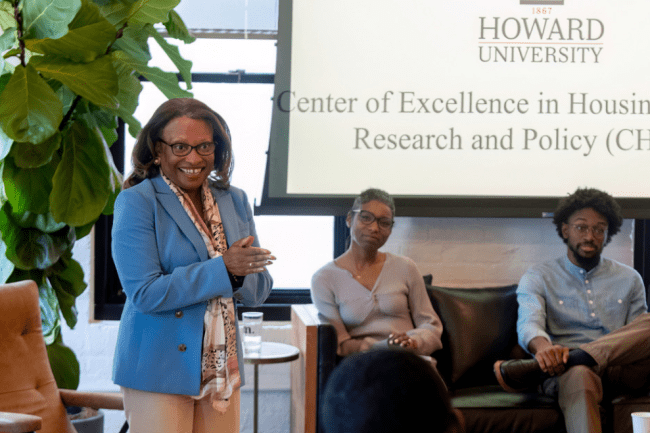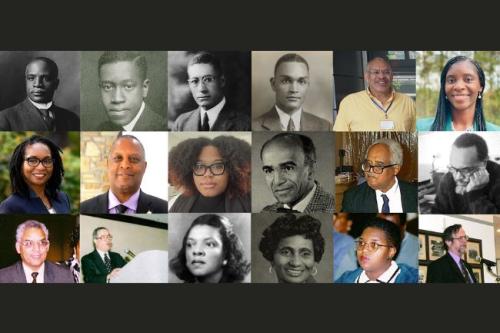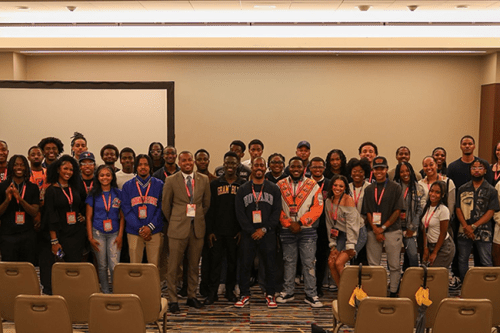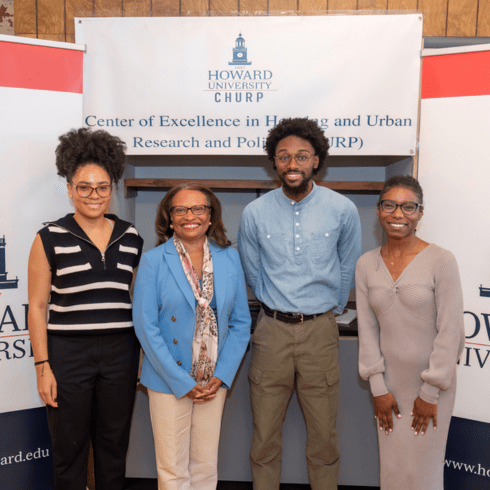
Howard University research fellows and doctoral candidates in economics led a deep dive on the issues facing America’s neighborhoods as Adrianne Todman, acting secretary of the U.S. Department of Housing and Urban Development (HUD) visited the university’s Center of Excellence in Housing and Urban Research Policy (CHURP). Todman’s visit was designed so she could hear research on issues related to public and assisted housing, including rent control, the racial wealth gap, and the intersection of homelessness and climate change. The research is being conducted by the center’s research fellows.
The acting secretary spoke about the importance of the discovery happening at Howard and other HBCUs in helping to inform the work being conducted at HUD and to ensure housing and economic security for all Americans.
We don’t know how well our solutions are executing if we don’t have smart folks like you come behind us and say, well, here’s what’s going on, or better yet, taking a look at the community and seeing what the core issues are notwithstanding your own opinion."
“People like me need to know more about how our solutions are really addressing the core causes of many things people are experiencing, whether it be poverty, whether it be homelessness, whether it be the gap in Black wealth, or certainly ways we need to think about housing affordability,” she said. “We don’t know how well our solutions are executing if we don’t have smart folks like you come behind us and say, well, here’s what’s going on, or better yet, taking a look at the community and seeing what the core issues are notwithstanding your own opinion.”
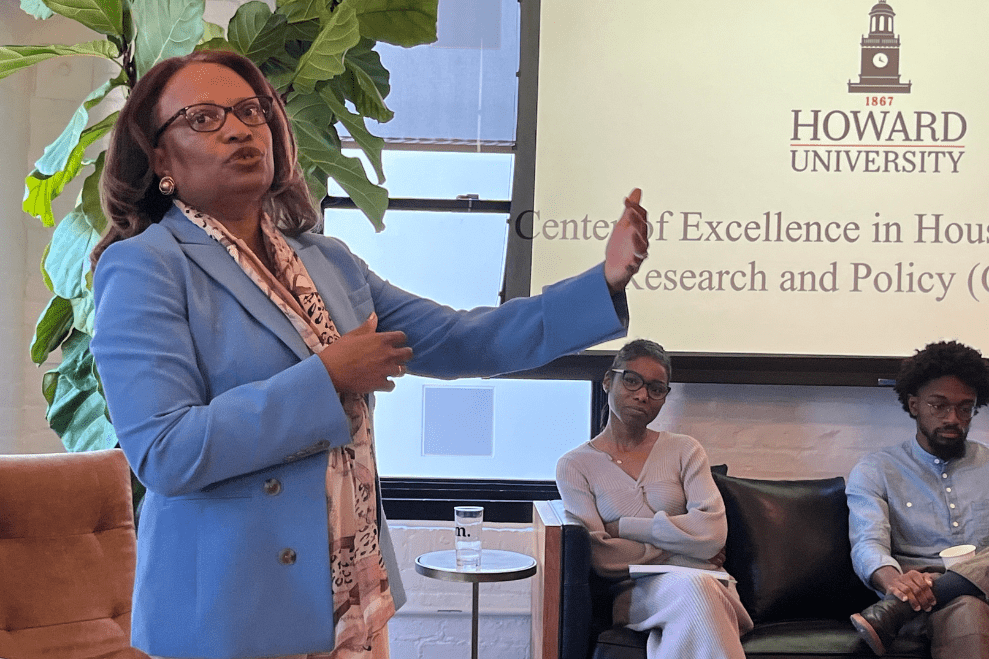
U.S. President Joseph R. Biden appointed Todman to be acting secretary of HUD in March 2024. In this role, she oversees the federal agency of approximately 8,000 employees responsible for national policy addressing housing needs, facilitating community development, and enforcing fair housing laws. Key programs administer mortgage and loan insurance, community development block grants, affordable and low-income housing programs, and fair housing public education. Prior to this appointment, the U.S. Virgin Islands native was unanimously confirmed by the U.S. Senate to be deputy secretary of HUD and has previously served as the CEO of the National Association of Housing and Redevelopment Officials and executive director of the District of Columbia Housing Authority (DCHA).
During her Howard visit, Todman was candid about the sociopolitical environment we live in, where trust in traditional power centers, like government and universities, has taken a nosedive. She discussed emerging policy issues, such as the living needs of the elderly in the middle class, who do not have the income of the rich nor can they take advantage of programs for the poor. She also highlighted HUD’s role in “knitting” back together communities ravaged by natural disasters by providing funding and services to help those communities rebuild. She noted that housing advocates will need “all hands on deck” to solve persistent problems, especially at a time when some doubt the ability of the federal government to address challenges.
So many people have lost faith in institutions, and we need to find a way to bring that faith back."
“So many people have lost faith in institutions, and we need to find a way to bring that faith back,” Todman insisted. “How do we make the human experience in this country better so that we can become more unified? I think that so much of what is dividing us right now in addition to race is the economic status of people, no matter their color, no matter their gender. I think that the work you are doing right now to help us improve that through housing is phenomenal.”
Todman heard presentations from a number of Howard research associates and fellows, including Jasmine Fuller, who presented research showing how the homeless population is increasingly at risk due to climate change. As opposed to using aggregated data, her research used “311” data collected from calls to request city services and report homeless encampments, helping to create a block-by-block picture of the homeless situation in cities like New York City. She explored exposure to air pollution and extreme heat in major cities to understand patterns over time related to specific locations. As she outlined the research, she also spoke about how her work has impacted her personally.
“It brings you closer to that community, because that could be you,” Fuller said. “It gives you a greater understanding of what these populations are going through and motivates you to want to help them and make everything better.”
Fuller is a fourth-year economics Ph.D. student specializing in urban and environmental economics. After she earns her doctorate, she plans to pursue further research on the economic impact of climate change in hopes of making public policy more equitable.

Research fellow Joseph Dean focused on the efficacy of rent control in Washington, DC. Dean used both public and proprietary data to create a dataset of rentals in the city to determine if rent-controlled units really have a demonstrable economic benefit for the populations they are meant to help. He earned a master’s degree in economics from Howard and has research interests which include environmental economics, international trade, and racial and class inequality.
Digna Mosquera presented a methodology to examine the extent to which the racial wealth gap is influenced by the Black community’s engagement with financial advisors. She also looked at patterns in financial planning, as well as the projected wealth transfer in 2045. This research is in line with Mosquera’s broader research interests, which include inequality, migration, poverty, development, labor markets, and the economics of emerging countries. She earned a master’s degree from Howard and is currently pursuing a doctoral degree.
Jalissa Worthy looked at the resident leaders in public and assisted housing to gauge their influence in creating a positive living environment. The research also elevates opinions related to public housing governance and the extent to which the views of resident leaders are incorporated into public housing policy. Worthy’s exploration of public housing resident leadership echoes her other research, which focuses on cognitive social capital, social justice, and community organizing within Black communities. She is a second-year Ph.D. student in Howard’s School of Social Work.
CHURP leads efforts to achieve an equitable and inclusionary society by fostering policy implementation which eliminates inequities in housing, health, education, economic well-being, and community development. The center is an outgrowth of Howard’s historic research and program evaluation in urban affairs, workforce development, environmental justice, the racial wealth gap, health care disparities, and the underserved. The center is led by Dr. Haydar Kurban, director, Dr. Rodney Green, associate director, and Drs. Omari Swinton and Sandra Crewe, who serve as co-principal investigators.
More information about CHURP can be found here.


